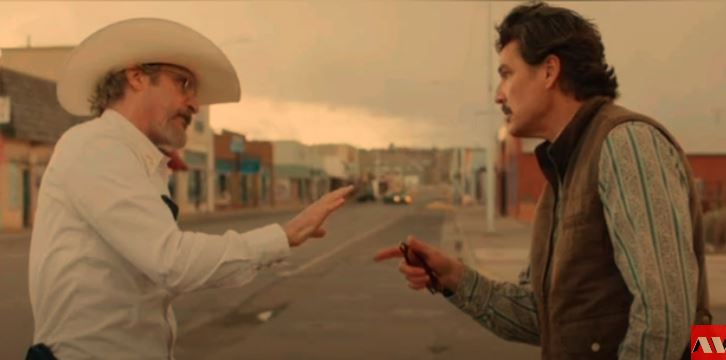Ari Aster’s Eddington has been stirring conversations from the moment it hit theaters, with its complex characters, layered themes, and a narrative that dives deep into the heart of American politics. But for those patient enough to stay after the credits roll, there’s one last surprise: the after-credits scene.
While many films leave something behind in the credits — a fun stinger or a teaser for a potential sequel — Aster’s scene in Eddington is anything but a lighthearted moment. Instead, it adds another dimension to an already heavy exploration of societal collapse and personal downfall.
The Meaning Behind the After-Credits Moment
At the film’s conclusion, after the chaos of Joe Cross’ (Joaquin Phoenix) political journey and his spiral into violence, the after-credits scene offers a reflective pause. It’s not just a continuation of the story; it’s a deepening of the movie’s central message.

The scene underscores Aster’s intent to show the consequences of Joe’s actions. After everything that has happened in Eddington — the lies, the manipulation, the violence — the town’s future remains bleak. The after-credits scene emphasizes the ongoing struggle, with Joe now sidelined and a new, more ominous force taking control: a tech company that symbolizes the corporate takeover of both the town and the people’s future.
What Happens at the End of Eddington?
To understand the weight of the after-credits moment, we need to grasp the film’s ending. By the time the film concludes, Sheriff Joe Cross has become mayor of Eddington, but his victory is hollow. His violent actions have led to his physical incapacitation, leaving him a figurehead, manipulated by the very forces he sought to resist.
This bleak conclusion doesn’t offer closure — instead, it leaves the audience with a sense of disillusionment. And the after-credits scene further complicates this by showing that despite Joe’s efforts, it’s the corporate overlords who truly hold power. The world Joe thought he was protecting continues to crumble.
Is Eddington a MAGA Film?
One of the film’s key criticisms is its political commentary. The portrayal of Joe’s rise to power, driven by a populist agenda, has led many to question if Eddington serves as a critique of the MAGA movement. The film seems to point to the dangers of a world where misinformation and fear become tools for gaining power.
However, the after-credits scene suggests something even more sinister. It’s not just about left versus right; it’s about the manipulation of both sides for the benefit of a few. Aster seems to be telling us that the real threat comes not from political ideologies, but from the system that profits off division and chaos.
Who Directed Eddington?
Ari Aster, known for his previous works Hereditary and Midsommar, brings his signature style to Eddington. Aster doesn’t shy away from the uncomfortable truths of modern life, and Eddington is no exception. His direction explores the personal and societal decay, all while asking hard questions about the state of the world.
In Eddington, Aster blends horror with social commentary, making a statement about the fractured nature of contemporary America. The after-credits scene, as much as the rest of the film, highlights his ability to mix subtlety with harsh truths.
What Inspired Ari Aster to Make Midsommar?
Aster’s exploration of the darker sides of human nature is a theme that runs through all his films. In Midsommar, he delved into the destructive power of community and grief, while Eddington tackles the rise of populism, misinformation, and the disillusionment that follows.
Both films are deeply concerned with how individuals cope with pain and alienation. In Eddington, Aster seems to be exploring how societies deal with crisis — and how easily people can be manipulated when they’re most vulnerable. The after-credits scene gives us one final look at the true consequences of such manipulation.
What Did Ari Aster Say About Beau is Afraid?
In interviews about his earlier film, Beau is Afraid, Aster discussed the role of fear in shaping human actions. In Eddington, the fear of losing control, of being forgotten, drives Joe’s descent into violence. The film, and especially the after-credits scene, suggests that fear isn’t just personal — it’s a societal problem.
Aster’s ability to craft narratives that explore both individual and collective fear is evident in Eddington, and the after-credits moment offers a chilling reminder of how unchecked power and manipulation can warp reality.
Eddington’s After-Credits Scene: A Deeper Dive into the Future
As Eddington fades out, the after-credits scene leaves the audience with one final, sobering look at the future of the town — and America at large. The film may have ended, but the consequences of Joe’s actions and the societal issues it highlights continue to reverberate.
By sticking around after the credits, viewers get a glimpse of the true, long-term impact of the events in Eddington. Aster’s darkly cynical view of a society ruled by misinformation, corporate interests, and personal delusion is laid bare.
Conclusion: Eddington’s Legacy
The after-credits scene in Eddington may not provide a clear resolution, but it does give us something far more valuable — a stark reminder of the world we live in. Through Aster’s lens, we are forced to confront the reality of a divided America, where power isn’t necessarily in the hands of the people but in the hands of those who manipulate the system.
For anyone who’s willing to look beyond the credits, Eddington leaves an indelible impression — one that challenges us to rethink our place in this world.
Related Information Table
| Keyword | Information |
|---|---|
| What is Eddington about? | Eddington is a satirical exploration of American political division, focusing on a small-town sheriff and his rise to power during a global crisis. |
| Ari Aster’s filmmaking style | Known for blending horror with dark social commentary, Aster’s films challenge societal norms and explore deep psychological themes. |
| What happens to Joe at the end of Eddington? | Joe Cross becomes a puppet of corporate interests, physically disabled and politically sidelined, highlighting the futility of his earlier quest for power. |
| Ari Aster’s influence on modern cinema | Aster is reshaping the horror genre, focusing on the personal and societal impacts of grief, trauma, and manipulation, evident in Eddington. |
